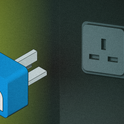If Charter 88 weren't so holier-than-thou I'm sure I would not have been quite so irritated to discover that their Web page (www.gn.apc.org/charter88) is: (a) provided by GreenNet and (b) very hard to get into. I gave up on each of my first three attempts and in the end found that only a very big, fast system could cope tolerably with its slow responses. Okay, there might have been a lot of traffic on the first or second attempts, but three-out-of-three sounds more like techno-incompetence. I now have this disturbing image of cyberactive citizens staring at their screens, waiting for half an hour to register their digital horror at the iniquities of the first-past-the-post electoral system-and then having to wait for another half an hour before they can electronically agree with everyone else out there about just how terribly important it is for the UK to adopt the European Convention on Human Rights (which I'm sure it is).
Cyber-correctness aside, the site is an interesting reference point for much that civil libertarians hold dear-and a goldmine for anti-government facts and figures. Did you know that between 1945 and 1970 the guillotine, a procedural motion to curtail debate in the House of Commons, was used on only 22 occasions, but between 1979 and 1990 it was used 79 times? Or that in 1992 it required only 41,930 votes to elect a Tory MP, 42,657 to elect a Labour one, 209,855 for a Liberal Democrat, and 170,047 votes still got you no Green MPs? Try to remember that this is supposed to be an argument in favour of electoral reform, not against it.
@
OJ has been big news on the Net. Netscape's search engine registers a hundred separate entries: you could watch the trial on the Net, join discussions about OJ, read critical analyses or eulogies, discover what OJ likes for breakfast and so on. Whatever you think about all this, the Net's response does demonstrate one of its more valuable attributes: its flexibility and the speed with which it can provide a forum for the expression of instant opinion. Punch "OJ Simpson" into your search engine and follow the links.
@
No sooner does Prospect establish a column called the Net Position than a film opens in the UK called simply The Net. I can imagine the conversation somewhere in Hollywood: "Hey Calvin, this Internet thing seems like it's really taking off. Pretty soon they'll have magazine columns discussing it. Let's make a movie about the Internet and get rich. By the way, what the hell is it?" Calvin needs the work but quickly discovers that it's very hard to make a movie about cyberspace. Digital may be fun but it's not photogenic. What we have instead is a run-of-the-mill thriller with a higher than usual number of computers in it-and a teeny bit of anorak-speak. However, the excitement and interest, such as it is, comes in rather conventional forms: car chases, conspiracies, sex, murder and the struggle between good and evil. Our heroine pursues a Bill-Gates-look-alike figure who has invented a computer security system which is being taken up by all kinds of banks, public utilities and federal agencies. The system looks set fair to become as ubiquitous as MS-DOS and Windows which-in real life and no doubt by a strange coincidence-are also produced by a Bill-Gates-look-alike. But the naughty Bill-Gates-look-alike has inserted some code into the software which allows him and his accomplices to hack into any system using it with no trouble at all, and do whatever they like-mess up the national banking system, falsify medical or criminal records, send pizzas to people who haven't ordered them, and so on. As a way of illuminating anything of interest or importance about the Internet it scores zero. As a thriller...
@
If thrillers are not your thing, then how about MoneyWeb, described in the Financial Times as "the most comprehensive UK personal financial site"? So impressed were the MoneyWeb authors with Rudi Bogni's piece in our first edition, "Jellyrolls and Alligator Spreads," that they asked the Net Position if they could copy it. We have graciously agreed. Drop in and have a look. You can find them on: www.demon.co.uk/moneyweb.
We also had a poetic reaction from the University of Sunderland, where they have created a site with routes into such things as the Internet Movie Database, and Film and Media Studies on the Web. They are on: http://orac.sund.ac.uk
A lengthy e-mail reaches us from ben.parker@unep.no on how the Internet can help poor countries leapfrog stages of development. Well, yes, up to a point-Minister. To gain access to the Internet, at least for the forseeable future, you will need a PC, a modem, electrical power of some kind and a telephone system. These things are not always thick on the ground in the third world. And while information is a necessary condition of social and economic progress, it is in itself neither the solution nor the problem. Oppressive political regimes, a lack of capital, low levels of literacy or poor health services are usually much more significant. The Internet cannot yet plough a field or build a generator, and the hype merchants should not forget that. n
John Carr
You can contact the Net Position on: 100643.455@compuserve.com
The net position
November 20, 1995











